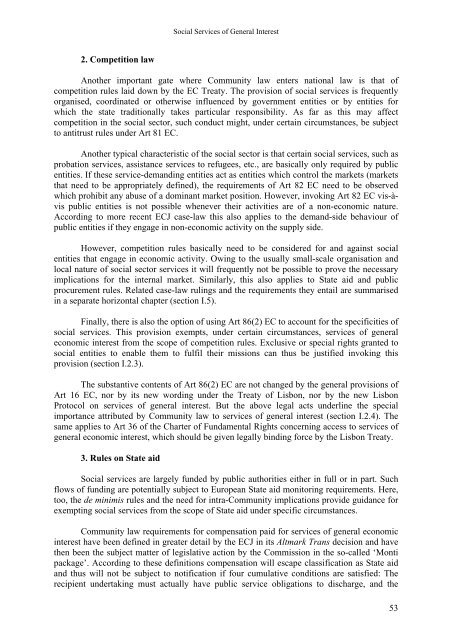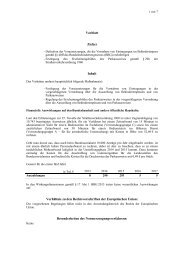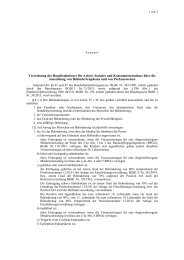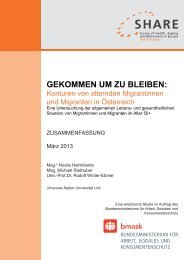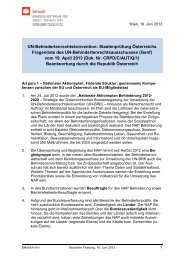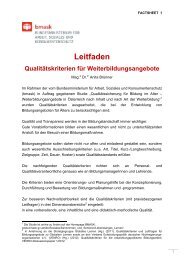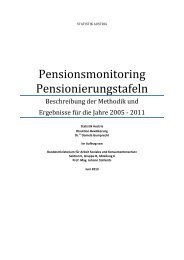Social Services of General Interest (SSGI)
Social Services of General Interest (SSGI)
Social Services of General Interest (SSGI)
You also want an ePaper? Increase the reach of your titles
YUMPU automatically turns print PDFs into web optimized ePapers that Google loves.
2. Competition law<br />
<strong>Social</strong> <strong>Services</strong> <strong>of</strong> <strong>General</strong> <strong>Interest</strong><br />
Another important gate where Community law enters national law is that <strong>of</strong><br />
competition rules laid down by the EC Treaty. The provision <strong>of</strong> social services is frequently<br />
organised, coordinated or otherwise influenced by government entities or by entities for<br />
which the state traditionally takes particular responsibility. As far as this may affect<br />
competition in the social sector, such conduct might, under certain circumstances, be subject<br />
to antitrust rules under Art 81 EC.<br />
Another typical characteristic <strong>of</strong> the social sector is that certain social services, such as<br />
probation services, assistance services to refugees, etc., are basically only required by public<br />
entities. If these service-demanding entities act as entities which control the markets (markets<br />
that need to be appropriately defined), the requirements <strong>of</strong> Art 82 EC need to be observed<br />
which prohibit any abuse <strong>of</strong> a dominant market position. However, invoking Art 82 EC vis-àvis<br />
public entities is not possible whenever their activities are <strong>of</strong> a non-economic nature.<br />
According to more recent ECJ case-law this also applies to the demand-side behaviour <strong>of</strong><br />
public entities if they engage in non-economic activity on the supply side.<br />
However, competition rules basically need to be considered for and against social<br />
entities that engage in economic activity. Owing to the usually small-scale organisation and<br />
local nature <strong>of</strong> social sector services it will frequently not be possible to prove the necessary<br />
implications for the internal market. Similarly, this also applies to State aid and public<br />
procurement rules. Related case-law rulings and the requirements they entail are summarised<br />
in a separate horizontal chapter (section I.5).<br />
Finally, there is also the option <strong>of</strong> using Art 86(2) EC to account for the specificities <strong>of</strong><br />
social services. This provision exempts, under certain circumstances, services <strong>of</strong> general<br />
economic interest from the scope <strong>of</strong> competition rules. Exclusive or special rights granted to<br />
social entities to enable them to fulfil their missions can thus be justified invoking this<br />
provision (section I.2.3).<br />
The substantive contents <strong>of</strong> Art 86(2) EC are not changed by the general provisions <strong>of</strong><br />
Art 16 EC, nor by its new wording under the Treaty <strong>of</strong> Lisbon, nor by the new Lisbon<br />
Protocol on services <strong>of</strong> general interest. But the above legal acts underline the special<br />
importance attributed by Community law to services <strong>of</strong> general interest (section I.2.4). The<br />
same applies to Art 36 <strong>of</strong> the Charter <strong>of</strong> Fundamental Rights concerning access to services <strong>of</strong><br />
general economic interest, which should be given legally binding force by the Lisbon Treaty.<br />
3. Rules on State aid<br />
<strong>Social</strong> services are largely funded by public authorities either in full or in part. Such<br />
flows <strong>of</strong> funding are potentially subject to European State aid monitoring requirements. Here,<br />
too, the de minimis rules and the need for intra-Community implications provide guidance for<br />
exempting social services from the scope <strong>of</strong> State aid under specific circumstances.<br />
Community law requirements for compensation paid for services <strong>of</strong> general economic<br />
interest have been defined in greater detail by the ECJ in its Altmark Trans decision and have<br />
then been the subject matter <strong>of</strong> legislative action by the Commission in the so-called ‘Monti<br />
package’. According to these definitions compensation will escape classification as State aid<br />
and thus will not be subject to notification if four cumulative conditions are satisfied: The<br />
recipient undertaking must actually have public service obligations to discharge, and the<br />
53


